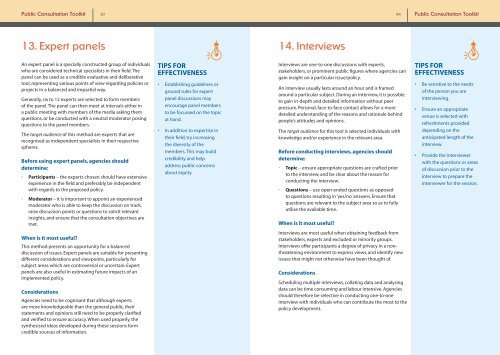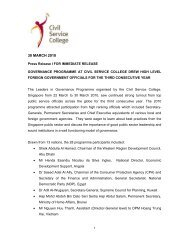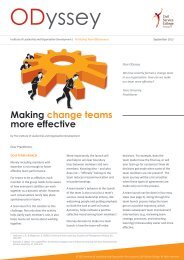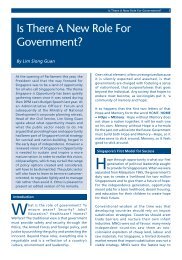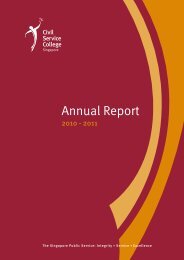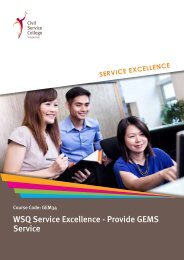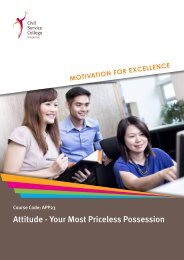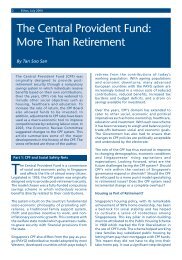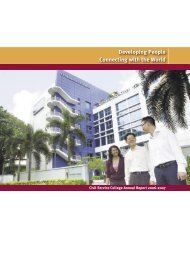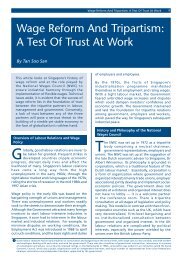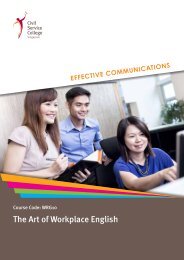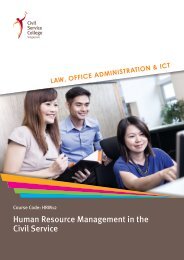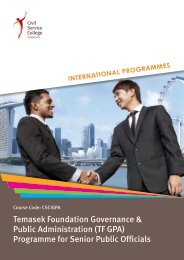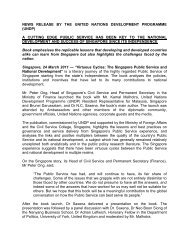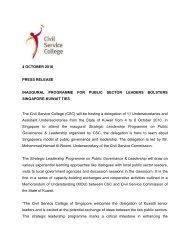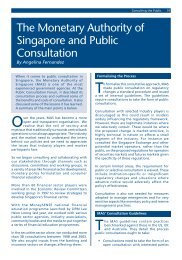Public Consultation Toolkit - Civil Service College
Public Consultation Toolkit - Civil Service College
Public Consultation Toolkit - Civil Service College
Create successful ePaper yourself
Turn your PDF publications into a flip-book with our unique Google optimized e-Paper software.
<strong>Public</strong> <strong>Consultation</strong> <strong>Toolkit</strong> 83 84 <strong>Public</strong> <strong>Consultation</strong> <strong>Toolkit</strong><br />
13. Expert panels<br />
14. Interviews<br />
An expert panel is a specially constructed group of individuals<br />
who are considered technical specialists in their field. The<br />
panel can be used as a credible evaluative and deliberative<br />
tool, representing various points of view regarding policies or<br />
projects in a balanced and impartial way.<br />
Generally, six to 12 experts are selected to form members<br />
of the panel. The panel can then meet at intervals either in<br />
a public meeting with members of the media asking them<br />
questions, or be conducted with a neutral moderator posing<br />
questions to the panel members.<br />
The target audience of this method are experts that are<br />
recognised as independent specialists in their respective<br />
spheres.<br />
Before using expert panels, agencies should<br />
determine:<br />
• Participants – the experts chosen should have extensive<br />
experience in the field and preferably be independent<br />
with regards to the proposed policy.<br />
• Moderator – it is important to appoint an experienced<br />
moderator who is able to keep the discussion on track,<br />
raise discussion points or questions to solicit relevant<br />
insights, and ensure that the consultation objectives are<br />
met.<br />
TIPS FOR<br />
EFFECTIVENESS<br />
• Establishing guidelines or<br />
ground rules for expert<br />
panel discussions may<br />
encourage panel members<br />
to be focussed on the topic<br />
at hand.<br />
• In addition to expertise in<br />
their field, try increasing<br />
the diversity of the<br />
members. This may build<br />
credibility and help<br />
address public concerns<br />
about equity.<br />
Interviews are one-to-one discussions with experts,<br />
stakeholders, or prominent public figures where agencies can<br />
gain insight on a particular issue/policy.<br />
An interview usually lasts around an hour and is framed<br />
around a particular subject. During an interview, it is possible<br />
to gain in-depth and detailed information without peer<br />
pressure. Personal, face-to-face contact allows for a more<br />
detailed understanding of the reasons and rationale behind<br />
people’s attitudes and opinions.<br />
The target audience for this tool is selected individuals with<br />
knowledge and/or experience in the relevant area.<br />
Before conducting interviews, agencies should<br />
determine:<br />
• Topic – ensure appropriate questions are crafted prior<br />
to the interview, and be clear about the reason for<br />
conducting the interview.<br />
• Questions – use open-ended questions as opposed<br />
to questions resulting in ‘yes/no’ answers. Ensure that<br />
questions are relevant to the subject area so as to fully<br />
utilise the available time.<br />
When is it most useful?<br />
TIPS FOR<br />
EFFECTIVENESS<br />
• Be sensitive to the needs<br />
of the person you are<br />
interviewing.<br />
• Ensure an appropriate<br />
venue is selected with<br />
refreshments provided<br />
depending on the<br />
anticipated length of the<br />
interview.<br />
• Provide the interviewer<br />
with the questions or areas<br />
of discussion prior to the<br />
interview to prepare the<br />
interviewer for the session.<br />
When is it most useful?<br />
This method presents an opportunity for a balanced<br />
discussion of issues. Expert panels are suitable for presenting<br />
different considerations and viewpoints, particularly for<br />
subject areas which are controversial or uncertain. Expert<br />
panels are also useful in estimating future impacts of an<br />
implemented policy.<br />
Considerations<br />
Agencies need to be cognisant that although experts<br />
are more knowledgeable than the general public, their<br />
statements and opinions still need to be properly clarified<br />
and verified to ensure accuracy. When used properly, the<br />
synthesised ideas developed during these sessions form<br />
credible sources of information.<br />
Interviews are most useful when obtaining feedback from<br />
stakeholders, experts and excluded or minority groups.<br />
Interviews offer participants a degree of privacy in a nonthreatening<br />
environment to express views, and identify new<br />
issues that might not otherwise have been thought of.<br />
Considerations<br />
Scheduling multiple interviews, collating data and analysing<br />
data can be time consuming and labour intensive. Agencies<br />
should therefore be selective in conducting one-to-one<br />
interview with individuals who can contribute the most to the<br />
policy development.


